How to recognize and help a stressed Betta.
Recognizing Signs of Stress In Betta
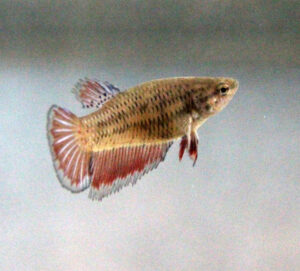
A stressed Betta is generally easy to recognize. They will often be listless staying in one area of their tank, typically the bottom of the tank. They may
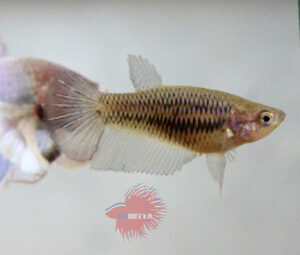
appear discolored. Usually a stressed Betta will be much lighter in color than usual and they will likely have markings missing. A very stressed Betta could even look like an entirely different fish due to the extreme loss of color they go through when stressed. Often they will display what is known as fin clamping, keeping their fins tightly closed and tucked close to their body. Large gill movements are another possible sign of a stressed Betta. Most healthy Betta would rather go gulp air than to “breathe” hard underwater. Some stressed Betta will also show a horizontal black line or stripe on both sides but young Betta will often have these naturally even when not stressed (they are known as juvenile stripes or bars on young Betta). These should not be confused with breeding bars which are vertical bars that appear on the sides of your Betta, usually female Betta, to show willingness to breed. Not all Betta who are stressed show the horizontal bars and it is more common to see in females vs the male Betta.
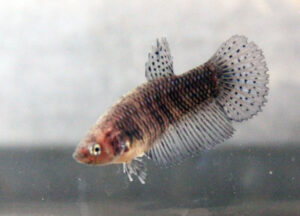
The primary difference between stress stripes and breeding bars is that one is lengthwise along the sides of the fish from head to tail and predominately this stripe is black. This is a stress stripe. Breeding stripes or bars run from the top to the bottom of the fish. Again, like stress stripes, breeding bars are most common in the female Betta. I have, in fact, never seen a male do the breeding bars in my many years working with the species but I cannot state it never happens.

Clamping is another way to tell a fish is stressed. A Betta clamping its fins will have its caudal (tail) fin closed tightly. It will often carry the dorsal (top) fin flat against the back. The anal fin (bottom) will also be pulled close to the body. It will have the ventral fins pulled against its body as well. The pectorals will also be pulled to the body and rarely moved. Its very noticeable the fish will look obviously depressed. Clamping is an extremely important thing to notice in your Betta. A Betta that is clamping is way more likely to go down hill than one just showing stress stripes.
What is stressing your fish?
Too much water movement:
One of the most common mistakes caring Betta keepers make is forgetting that Betta are a fish that prefer still water. Their natural environment in rice paddies rarely has any flow to it. In a tank with filtration it is very difficult to avoid flow and too much flow will often cause your fish to become stressed. Ideally using a sponge filter appropriate to the size of your tank is the best. Filters that take water out of the tank and then pump it back into tank will often be too strong of flow for a Betta especially true in small tanks under 10 gallons. You can try to baffle this flow with sponges or other media to lessen the swift flow that comes out of the filter to reduce your fish’s stress. You can also try adding decor and plants to also break up the flow. For a quick fix you can use a cleaned soda bottle and slit it the length of your filter outflow and then stick it on the outflow to slow the water somewhat while you find a permanent solution. It is important to quickly fix the problem that is causing your Betta to clamp because as stated above a clamped Betta is far more likely to get ill and die if they are not ill already.
Too much light:
Betta, like you, need a day night cycle to properly rest. Leaving your light on all the time or putting them in a room where there is light all the time will cause them stress. It is best to turn your fish’s light off each day for at least 8 hours and not have a light on 24/7. Its also better for your tank overall since too much light will cause the growth of various algae.
Tankmates:
Betta fish are not a community fish, but often unscrupulous sellers will promote them as a community fish. While it is true, in extremely well planted tanks with much decor you might be able to keep several female Betta together, the same is not true of male Betta. Males are hard wired to be aggressive. Putting them in a tank with other fish will almost always end poorly for both the other fish and the Betta. In some cases they do not even tolerate snails or shrimps in their tanks. Too much time stressing about other animals in their tank can cause your Betta to stress itself to death. You can try adding more plants, more decor to break LOS and give more hiding spots but in reality the absolute BEST thing you can do for your Betta is to house them alone. Many people feel as if this is mean or makes the fish lonely. They do not WANT companions YOU are assigning human emotion to an animal that is best housed alone.
Illness:
A sick Betta fish will also be stressed, and sometimes you cannot see why they are sick. Some illness are internal and it can be hard to fight these invisible illnesses. If you do not see obvious signs of illness on the outside of your fish and none of the other reasons for stress in this article are the case with your fish then it is possible you fish is suffering from an illness. You can treat the fish with OTC fish antibiotics, but is hard to know what one to use when you do not know what is wrong with the fish. For a standard broad spectrum treatment we recommend Kanaplex. We recommend this medication as it will treat most bacterial infections your fish might have and they do not need to eat it to be treated. We have had the best results using Kanaplex for unknown illness with Betta.
Water Condition:
Many people do not know or understand the nitrogen cycle that occurs in tanks. Most do not cycle their tanks prior to putting fish into a newly setup tank. And there are some that do not know tap water has to be treated before being used due to the presence of chlorine or heavy metals. If you are one of those people, this could be the reason your fish is not doing well. Tap water, especially that in city’s and towns that come from municipal sources, often contain chlorine or chlorides. Well water can contain heavy metals or worse things. Either way it is important to treat your water before putting a fish into a tank. We recommend using Prime Water Conditioner every time you put water in your tank. We also recommend that you test your tap water regularly. You will be surprised how much the quality of your tap water, even well water, changes throughout the year. If your tap water is high in ammonia, nitrates, or nitrites this can directly effect the health of your fish pretty rapidly. If you are not, we recommend you also test your tank water regularly for these as well. High values in any of these can cause your fish to become very sick. If you did not cycle your tank prior to adding fish you are going to have to do nearly daily testing and water change anytime these values become high. The smaller the tank, the more often you will have to water change If you have not gotten a testing kit we recommend the Freshwater Master Kit by API. We DO NOT recommend ANY test stick like tests as these are wildly inaccurate. As these are what most of the big pet store chains use to test your water for your we also do not recommend going by what they say your values are. Get a Freshwater Master kit, it will save you a ton of headaches in the long run.
Too Cold:
Betta are a tropical fish who require water temperatures of 72-82. We recommend keeping your Betta’s tank at 78 degrees unless you are prepping to breed or rearing fry (fish being prepped for breeding and fry often are better at 80-82 degrees). A Betta fish that is kept without a heater will often become stressed as the cold water will decrease their appetite and immune system and eventually lead to illness. If you do not have a heater in with your fish we recommend you get one if the room where it is being housed is not at least 75 at all times.
4 comments
Reply
You must be logged in to post a comment.





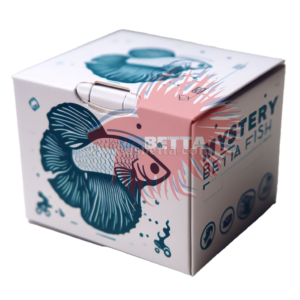

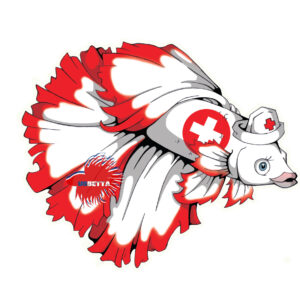



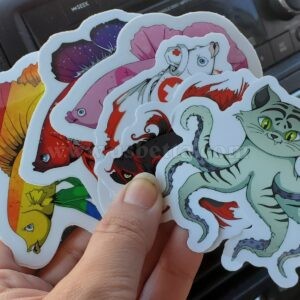
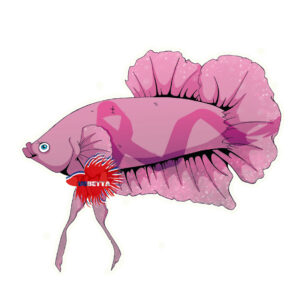

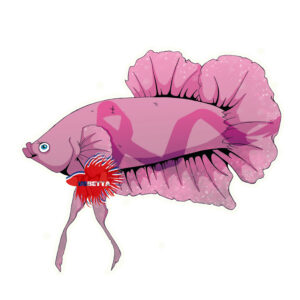

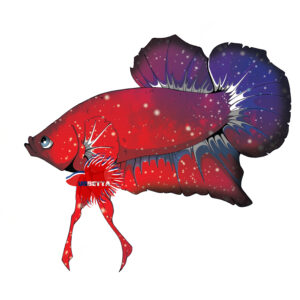
Good write ups Appreciate it.
Terrific postings, With thanks!
Really lots of excellent facts.
Many thanks! Loads of info.